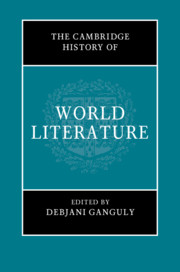Book contents
- The Cambridge History of World Literature
- The Cambridge History of World Literature
- Copyright page
- Contents
- Figures
- Contributors
- Acknowledgements
- Introduction
- Part I Genealogies
- Part II Thinking the World
- Part III Transregional Worlding
- 14 East Asia as Comparative Paradigm
- 15 Latin American Baroque: Or Error by Design
- 16 Comparative World Literature and Worlds in Portuguese
- 17 Africa and World Literature
- 18 Literary Revolution: Ireland and the World
- 19 Korean Worlds and Echoes from the Cold War
- 20 French Colonial Literature in Indochina: Colonial Adventure and Continental Drift
- 21 From Diasporic Tamil Literature to Global Tamil Literature
- Part IV Cartographic Shifts
- Part V World Literature and Translation
- Part VI Poetics, Genre, Intermediality
- Part VII Scales, Polysystems, Canons
- Part VIII Modes of Reading and Circulation
- Part IX The Worldly and the Planetary
- Index
- References
21 - From Diasporic Tamil Literature to Global Tamil Literature
from Part III - Transregional Worlding
Published online by Cambridge University Press: 17 August 2021
- The Cambridge History of World Literature
- The Cambridge History of World Literature
- Copyright page
- Contents
- Figures
- Contributors
- Acknowledgements
- Introduction
- Part I Genealogies
- Part II Thinking the World
- Part III Transregional Worlding
- 14 East Asia as Comparative Paradigm
- 15 Latin American Baroque: Or Error by Design
- 16 Comparative World Literature and Worlds in Portuguese
- 17 Africa and World Literature
- 18 Literary Revolution: Ireland and the World
- 19 Korean Worlds and Echoes from the Cold War
- 20 French Colonial Literature in Indochina: Colonial Adventure and Continental Drift
- 21 From Diasporic Tamil Literature to Global Tamil Literature
- Part IV Cartographic Shifts
- Part V World Literature and Translation
- Part VI Poetics, Genre, Intermediality
- Part VII Scales, Polysystems, Canons
- Part VIII Modes of Reading and Circulation
- Part IX The Worldly and the Planetary
- Index
- References
Summary
This chapter examines the unique case of the emergence of a new world literature (in the sense of a literary system operating on a global scale), a case that has so far been absent from discussions of world literature in the Anglo-American academy and beyond. This new world literature is the literature of ‘global Tamil’. Until about the last decade of the twentieth century, ‘Tamil literature’ was used to refer to literature produced by the Tamil people of India and Sri Lanka, as well as Tamil speakers in Singapore and Malaysia. Today, at the beginning of the twenty-first century, Tamil literature has transcended this earlier geography. The chapter traces the emergence of Tamil literature as a new world literature through two waves of migration of Tamils from South India and Sri Lanka to other parts of the globe, and it examines the writing generated by this movement of people and ideas.
- Type
- Chapter
- Information
- The Cambridge History of World Literature , pp. 393 - 408Publisher: Cambridge University PressPrint publication year: 2021



